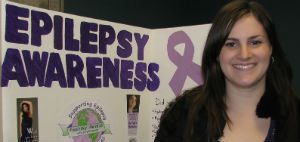By Deron Hamel
When searching for a topic for her master’s thesis at Brock University, Suzanne McGuire noticed a lack of published information about how young women living with epilepsy disclose their condition.

Epilepsy, McGuire notes, is one of the oldest documented medical conditions, yet, there is little information about how people disclose their condition. This gap in available information sparked her idea to interview women with epilepsy aged 20 to 35 to hear their stories and how they chose to disclose their condition to others.
Young women have a unique perspective on living with a seizure disorder, and McGuire wanted to share their experiences through her thesis.
Indeed, her choice of subject matter was unique – the lion’s share of research on how epilepsy affects people’s lives does not go beyond the impact of seizures. McGuire wanted to delve into the heart of the matter and hear women’s stories to discover if they chose to disclose their diagnosis to others and how people’s reaction – both positive and negative – affected their decision to continue to tell others.
The main thing McGuire says she discovered through her research is that there isn’t always a direct relationship between positive and negative experiences and epilepsy disclosure.
“If anything, it’s more like epilepsy disclosure is like a revolving door – no one is fully in or out of the shadows,” she tells Voices of Epilepsy.
“They will disclose epilepsy at certain times, when they think it’s appropriate, but in other circumstances, like job interviews, they’ll step back into the shadows and not be as open.”
McGuire’s research also indicated that living with epilepsy is a constant transforming process for young women.
“It is not something you’re just diagnosed with, you take your medication, and that’s it – it continually evolves and can affect your life in many different ways,” says McGuire, who completed her master’s degree in October.
McGuire says one of the most interesting discoveries that surfaced through her research is the near-instant sense of connection she had with the women she interviewed.
“We didn’t know each other at all previously, but we could just start talking to each other … (about) epilepsy,” she says. “That was quite interesting.”
If you have feedback on this story, or have a story of your own that you would like to share, please contact the newsroom at 800-294-0051, ext. 23, or e-mail deron(at)axiomnews.com. You can also leave a comment below.






